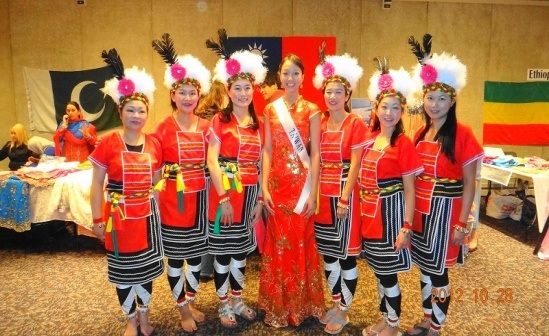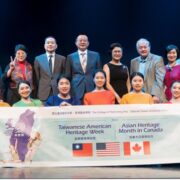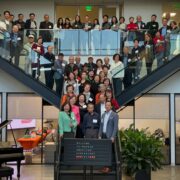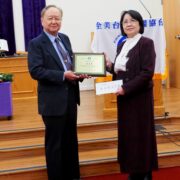A Brief History of Taiwanese American Association of the Capital District, New York (TAA-CDNY) and Taiwanese American Cultural Society of the Capital District (TACS)
Author: Chungchin Chen
The Establishment and Activities of the Taiwanese American Association
On Christmas 1970, over ten Taiwanese people gathered together to celebrate, and at this celebration they agreed to establish a Taiwanese association, which they temporarily named the “New York State Capital District Formosan Fellowship.” They also decided that on January 23rd of the following year, they would hold a New Year’s Dinner Party. They elected William H. Lee, who had settled in Capital District in 1967 and served in the state water bureau, as their President, and Chia-min Wang as their Vice-president. In 1971, there were 20 families and five individuals in the associations (including Dr. Or Hsieh, who served in the state Public Health Department). At the time, approximately one-third of the members worked in the state government and one-third for General Electric (GE). There were three medical interns, and six Ph.D. students from Rensselaer Polytechnic Institute (R.P.I.). Since the association was rather small, they only held a few events in their first year: a spring dinner, two picnics (one in the summer and one in the fall), and a New Year’s party. The membership fee was only fifty cents per person, so there was a total annual income of $58.00, and at the end of the year, there was $27.66 left over. It is evident that at that time, a majority of the Taiwanese American students who had just begun starting families and establishing careers in this new country were still quite frugal. Since the members’ economic foundations were weak, the association’s financial resources were also quite limited.
In 1971, the association’s preliminary by-laws were drafted, the name of the organization was changed to “New York State Capital District Formosan Club,” and it was officially registered as an organization with the New York State government. Unfortunately, since they didn’t understand American regulations well, they didn’t immediately apply to be filed as a 501(c) (3) not for profit organization with the federal Internal Revenue Service. It wasn’t until 1974 and 1984 that they applied, but they were unable to receive approval. In 1984, the association’s English name was changed to “Taiwanese American Association of the Capital District,” which is still being used today.
The number of members in the association increased each year. According to the communication records, the association had 53 participating households in 1974, 64 households in 1979, 69 households in 1982, and at its peak, 78 households in 1998. In the next two decades, changes in employment caused changes in membership, and membership stabilized at around 70 households. The Taiwanese American Association is a non-political association that sets its purpose as: “to strengthen, encourage, and promote understanding for Taiwan’s residents, history, culture, society, economy, government, and natural environment; and to promote friendship between members and communication between the association and other ethnic groups.” The qualifications for membership were quite broad: (1) those who were born and raised in Taiwan; (2) those who grew up in Taiwan and think of Taiwan as a first or second hometown; (3) those who have stayed in Taiwan for a short period of time to study or do business, and have showed kindness to the Taiwanese people; and (4) those who love and respect Taiwanese culture are all welcome to join. Thus, the association has some members who were not born in Taiwan, and during large gatherings, both Taiwanese and Mandarin are used.
In the 1980s, the Taiwanese American Association began to flourish, and the number of members increased. The second-generation also began attending middle and high school. Everyone enthusiastically donated their time, effort, and funds, and the association’s structural organization became more stable and mature than ever before. The association’s activities diversified; in addition to regularly scheduled holiday parties and outdoor picnics, they also hosted seminars (on topics like medical knowledge, making investments, and Taiwanese culture), film screenings, concerts, art exhibitions, ping pong competitions, indoor and outdoor tennis tournaments, youth camping trips, winter skiing outings, and the formation of a choir, a Taiwanese bible study (led by pastor Ching-fang Chen), a softball team, and more.
In mid-August 1983, then-Chairman of the Taiwan Provincial Government, Lee Teng-hui, visited Albany, the state capital, to meet New York Governor Mario Cuomo. He was accompanied by over a dozen people, including his wife, several directors, and his secretary. However, Cuomo avoided meeting him, leaving Lee Teng-hui waiting in a hotel for three or four days, and creating a very awkward situation. At that time, Chungchin Chen, who was serving as President of the association, collaborated with the International Students Association and the Chinese Society to host a welcome party for him at the R.P.I. Student Center. Over 200 association members and international students were in attendance. Lee Teng-hui gave his first speech in the United States on the topic of “An Army of a Hundred Thousand Agricultural Workers,” and it was brilliant.
After forming the softball team, they regularly went to upstate New York and northeastern North American to participate in games. In those days, softball games had become a way for Taiwanese associations from around the country to interact with one another. Since Albany is geographically well-situated, the State University of New York Albany campus had enough courts that, starting in 1980, the majority of the Taiwanese American East Coast Competitions were held in Albany. The Taiwanese American Association would serve as host and take care of the visiting teams. Each year, at the end of July, there would be two consecutive days of competition. Cheered on by the shouts of their respective cheerleading teams, the softball players showed of their skills, fighting for the championship. After the first day of the competition, everyone would gather together and hold a networking party that was complete with singing and dancing. The venue was always filled with the joyous atmosphere of friends, old and new, mingling with one another. There was a total of 12 teams playing in the 1982 competition, with over 200 players and cheerleaders. It was an unprecedented grand occasion. In 1984, the competition was renamed the “Ming Min Peng Cup” to recognized Ming Min Peng’s contributions to the Taiwan Independence and Democracy Movement. In July 1986, Ming Min Peng came to Albany in person to watch the competition and personally present the prize to the winners.
In an effort to increase the visibility of the Taiwanese American community and promote interaction between ethnic groups, in 1999 the association began actively participating in the Capital District Festival of Nations under the name “Taiwan.” They introduced Taiwanese culture and cuisine and encouraged Taiwanese American high school beauties to compete in the “Miss Festival” beauty pageant. Over the years that the association has attended the festival, there has been a candidate who placed in the top five contestants or won the pageant and brought glory to the Taiwanese American community.
Though the Taiwanese American Association is a non-political organization, this does not mean that individual members are not interested in Taiwan’s political situation and its future. FAPA Albany Chapter was established in 1986 with over ten core members who lobbied Congress members, held fundraising dinners, participated in demonstrations in New York City, submitted articles to newspaper publishers about Taiwan-China relations, and spoke out for Taiwan. Each time Taiwan held a Presidential election, many families returned to Taiwan to vote.
However, in 2002 the association began showing signs of organizational fatigue, and it was difficult to find someone to serve as president. Eventually, two founding members, William H. Lee and Chungchin Chen, voluntarily accepted the role of president in 2003 and 2004, helping the Taiwanese American Association overcome this obstacle.
Establishment and Activities of the Taiwanese American Cultural Society of the Capital District
The Taiwanese American Association’s experience with failing to be approved as a tax-exempt non-profit organization restricted its ability to fully function as a community organization by limiting its ability to seek both public and private donations or receive governmental or public recognition. In light of this, in 2003 the association’s Board of Directors decided to apply to the Internal Revenue Service as a tax-exempt non-profit organization under the name “Taiwanese American Cultural Society of the Capital District, Inc.” 36 members each donated $200 and the society was recommended by then-Director of the New York Council of Nonprofits, Chungchin Chen. They invited a professional lawyer to draft the certificate of incorporation and the organization by-laws, as well as to help manage the entirety of the application process. The Cultural Society held its first general assembly meeting on August 4th, 2004. Nine directors and four officials were elected: William C. Lee, President; Chungchin Chen, Vice-president; Wei-shih Yang, Secretary; and Li-ling Chen, Finance.
The Cultural Society’s mission and organization by-laws were stricter than the Taiwanese American Association’s, but they were also more flexible. The greatest benefit was, of course, that the society could legally expand its financial resources, reduce its insurance premiums, and lower various taxes in accordance with the regulations laid out for American non-profit organizations. For example, in 2005, the Cultural Society received a special grant of $3,000 from the State Assembly, and the amount collected from membership dues and donations totaled over 2.6 times more than the Taiwanese American Association had received. This increase in financial resources gave the Cultural Society the ability to support various charity, cultural, educational, and youth-oriented activities. Aside from enjoying the monetary benefits of qualifying as a non-profit organization, the Cultural Society also benefits from being able to be recognized and accepted by the general public, using its forward-looking appearance to enter mainstream American society.
After the Cultural Society was established, it was put in charge of hosting the annual Taiwanese American Heritage Week that occurs every May. The Cultural Society invited Taiwanese art troupes to come perform, and local politicians to attend. Since the event could be sponsored by businesses, most of the performances were hosted in the Egg, a performing arts venue in New York state. The Egg’s equipment meets global standards, and it has a sensational 1,000-seat stage. The event received media attention, which was effective in promoting Taiwanese culture and art and enhancing the visibility of the Taiwanese American community. Other events included concerts, painting exhibitions, film screenings, a Lantern Festival party, and topical lectures. The following speakers have given talks over the years: Fu-Tong Hsu (The Road to Dignity – The New Taiwanese Identity and Culture), Wen-cheng Lin (Expanding the Taiwanese American Horizon), Chungchin Chen (Exploring the Truth About the 228 Incident), Pou-ti Wang (Appreciating Taiwanese Opera’s Beauty), Joyce Weng (History in Literature – Discussing the Creation of the Yangmei Trilogy), Carole Hsu (The Creation and Inheritance of Taiwanese American Culture), David Taka Yo (The Global Contributions That Taiwan Has Made Since Ancient Times), and Yung-pin Liu (Hakka in Taiwan).
In response to major natural disasters that occurred in various places around the world, the Cultural Society promptly launched Taiwanese American donation campaigns for disaster relief. These campaigns responded to disasters like the huge tsunami that affected Southeast Asia in December 2004, Hurricane Katrina which severely impacted New Orleans in August 2005, Typhoon Morakot which caused major flooding in the Kaoping region of Taiwan in August 2009, and the Fukushima nuclear disaster that occurred in Japan in March 2011. Since the Cultural Society enjoys the status of tax-exemption, the decision-making process to choose how to fundraise and to whom the funds should be donated is very efficient, and so is the execution of these decisions.
The Taiwanese American Association of the Capital District originally did not have very many members. The Taiwanese American Association and Cultural Society had a lot of overlap between their members and directors, and their purposes and activities were also very similar. In total, there were 84 households in the two organizations combined. A general assembly vote in August 2008 decided that on October 1st, the two organizations would continue to exist, but would be managed under the same Board of Directors and officers. This strategy would save time and human resources, increase revenue, and reduce expenditures. It would also allow for more division of labor and cooperation on activities, and, given the nature of certain activities, certain events could be hosted by a single organization, or jointly by both. Wen-liang Yang took on the position of the Chairman of the joint Board of Directors, and President of the two organizations.
However, this kind of non-structural consolidation can cause some difficulties for actual operations. The main difficulty was that the Cultural Society was a tax-exempt non-profit organization that was registered in accordance with the law while the Taiwanese American Association was not. The Cultural Society was legally required to report its income and expenditures to the IRS and State Charity Bureau annually, while the Taiwanese American Association did not have to. Thus, the two organizations had to keep their bank accounts separated, and individual agendas and meeting minutes had to be kept during the Board of Directors’ meetings. The only way to resolve these issues was to merge the two organizations into a single one, slightly modifying the name of the organization without harming the identities of these Taiwanese American community organizations. Thus, they could maintain the qualifications for tax-exempt status, and these legal changes could be made very easily. Unfortunately, when this plan was proposed at the provisional general assembly held in September 2013, there was a minority of people with very strong ideologies that opposed the plan. Failing to reach a consensus, the 7-year joint Board of Directors finally stopped operations, and the cooperative relationship that once existed between the two organizations disappeared. The Taiwanese American community must be tolerant and accepting of each other’s different perspectives in order to grow and have strength. As a new immigrant community, we must all think about how we can inherit growth and develop sustainably and recognize our role as American citizens.
Sourced from Chungchin Chen
Translated from 311. 紐約首府區台灣同鄉會及台美文化促進會簡介 / 陳仲欽 /09/2017





